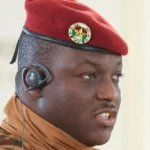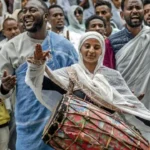South Sudan has been thrown into fresh political turmoil as its First Vice-President, Riek Machar, faces serious charges of murder, treason, and crimes against humanity. The charges were announced by Justice Minister Joseph Geng Akech, who linked Machar to a deadly attack in March by the White Army militia that killed more than 250 soldiers and a general. The case has sparked widespread concern that the world’s youngest nation could once again descend into civil war.
Machar, once a central figure in South Sudan’s peace process, has been under house arrest since March. His residence in the capital city, Juba, is currently surrounded by soldiers and tanks, reflecting the gravity of the accusations. Alongside him, seven senior officials, including Petroleum Minister Puot Kang Chol and Army Deputy Chief of Staff Lt Gen Gabriel Duop Lam, have also been charged and detained. Another 13 suspects are reportedly still at large. Both Machar and Chol have been suspended from their government duties, according to state television.
The charges stem from a violent assault carried out in March in the north-eastern town of Nasir, where the White Army militia—predominantly composed of fighters from Machar’s Nuer ethnic group—overran a military base. The attack not only resulted in heavy casualties but also led to the tragic death of a UN helicopter pilot after peacekeeping aircraft came under fire. The Justice Minister insisted that the charges send a strong message that atrocities against civilians, soldiers, or humanitarian personnel will not go unpunished, regardless of political influence or position.
Machar’s spokesperson, Puok Both Baluang, has dismissed the allegations, calling the move a “political witch-hunt” orchestrated by allies of President Salva Kiir. He argued that the crisis was manufactured to dismantle the fragile 2018 peace agreement and accused the judicial system of functioning as “politically directed courts” rather than as independent institutions. The spokesperson further warned that such politically motivated actions could unravel years of efforts to stabilize South Sudan.
South Sudan’s troubled history adds weight to these concerns. After gaining independence from Sudan in 2011, the nation quickly descended into civil war in 2013, with Machar’s forces clashing with those loyal to President Kiir. The conflict, rooted in long-standing ethnic rivalries between Kiir’s Dinka community and Machar’s Nuer ethnic group, lasted five years and claimed the lives of nearly 400,000 people before the signing of a peace deal in 2018. While that agreement brought a fragile calm, relations between Kiir and Machar have remained tense, often marked by mutual distrust, sporadic outbreaks of violence, and competing political ambitions.
The March attack has reignited fears that this fragile peace is collapsing. The White Army militia, which has historically aligned itself with Machar, has been accused of multiple atrocities during the civil war, making its resurgence particularly alarming. With ethnic tensions running high and both sides accusing each other of undermining the peace process, the charges against Machar could inflame divisions and destabilize the already volatile security situation.
The United Nations, the African Union, and neighboring countries have all called for restraint and urged both leaders to avoid plunging the nation back into bloodshed. Despite these appeals, the government insists the matter is now strictly judicial and should not be subject to political or diplomatic debate until the courts deliver their verdict.
Machar himself has yet to comment directly on the allegations. However, his allies argue that the charges are designed to silence him politically and consolidate Kiir’s power ahead of planned elections. Critics also warn that pursuing such high-level prosecutions without transparent due process risks further alienating Machar’s supporters and could reignite violent conflict across the country.
As the trial process begins, South Sudan finds itself once again at a dangerous crossroads. The international community is watching closely, fearing that the prosecution of Riek Machar, once a symbol of the peace agreement could mark the beginning of a new chapter of conflict. With much of the population still recovering from years of war, famine, and displacement, the stakes for peace and stability have never been higher.













Leave a comment